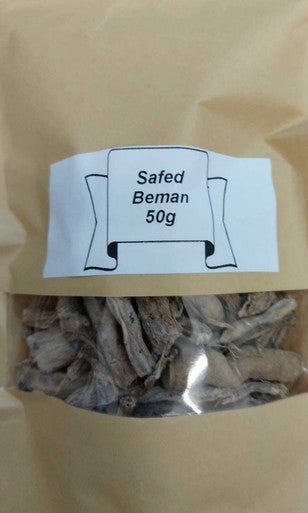safed beman 50g or Centaurea behen, also known as "white bachelor's button" or "white knapweed
safed beman 50g or Centaurea behen, also known as "white bachelor's button" or "white knapweed
Couldn't load pickup availability
safed beman 50g or Centaurea behen, also known as "white bachelor's button" or "white knapweed," has been traditionally used for various medicinal purposes, particularly in herbal and traditional medicine practices in regions where it is native. Here are some of the benefits and potential uses associated with Centaurea behen:
Potential Benefits of Centaurea behen
-
Anti-inflammatory Properties:
- Extracts from Centaurea behen have been reported to have anti-inflammatory effects. These properties make it potentially useful for reducing inflammation in conditions such as arthritis or skin inflammations.
-
Antioxidant Effects:
- Some studies suggest that the plant has antioxidant properties due to the presence of phenolic compounds. Antioxidants help neutralize free radicals in the body, potentially reducing the risk of chronic diseases and supporting overall health.
-
Diuretic Effects:
- Traditionally, parts of the Centaurea behen plant have been used to promote diuresis (increased urine production). This could be beneficial for conditions that require the removal of excess fluids from the body, such as hypertension or edema.
-
Digestive Aid:
- In some traditional medicine systems, Centaurea behen is used to support digestive health. It may help with digestion and alleviate issues such as bloating or indigestion.
-
Wound Healing:
- The plant is also used topically for its potential wound-healing properties. The extracts or poultices made from the plant are believed to help clean wounds and promote faster healing.
-
Antimicrobial Properties:
- Some research suggests that extracts from Centaurea behen might have antimicrobial activity against certain bacteria and fungi, which could make it useful in managing minor infections or as a natural preservative.
Note on Safety and Usage
- While there are traditional uses and some preliminary research supporting the benefits of Centaurea behen, it is important to approach its use with caution. Scientific evidence is still limited, and more research is needed to confirm these effects and determine safe dosages.
- If considering using Centaurea behen for medicinal purposes, it is best to consult a healthcare professional, especially if you are pregnant, nursing, or have any pre-existing health conditions.
Centaurea behen, commonly known as "white bachelor's button" or "white knapweed," is a flowering plant species belonging to the Asteraceae family. It is native to parts of Europe, Central Asia, and the Mediterranean region. The plant is known for its characteristic white or pale pink flowers, which bloom in clusters.
Key Characteristics of Centaurea behen:
- Appearance: Centaurea behen has a bushy growth habit, with a height ranging from 30 to 60 cm. Its leaves are typically lance-shaped, and the flowers are usually white or light pink with a thistle-like appearance.
- Habitat: It is often found in dry, rocky, or grassy areas, including meadows, slopes, and roadsides. It prefers well-drained soils and sunny locations.
- Medicinal Uses: In traditional medicine, parts of the plant have been used for various purposes, including as a diuretic, anti-inflammatory, or to treat wounds, although more scientific research is needed to support these uses.
- Cultivation: It is sometimes grown in gardens for its ornamental value, particularly in wildflower gardens or naturalistic plantings.
Share


